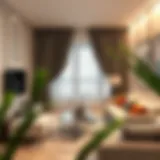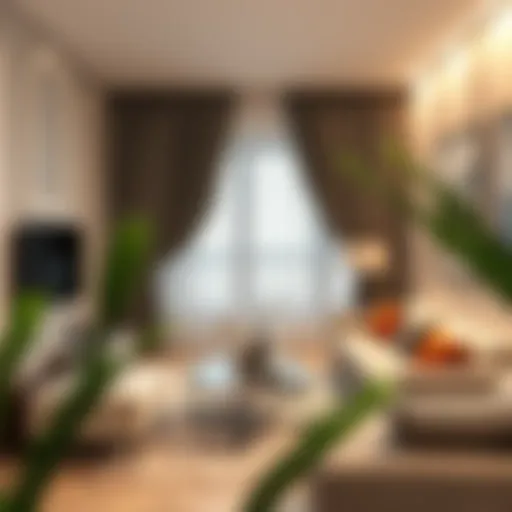Exploring Plant Studios in Dubai: A Comprehensive Guide
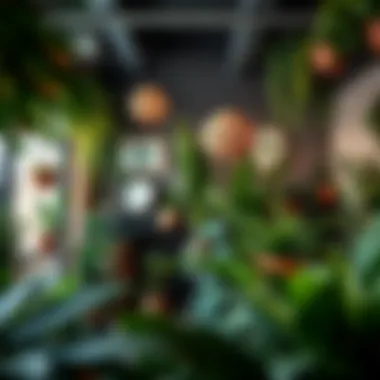
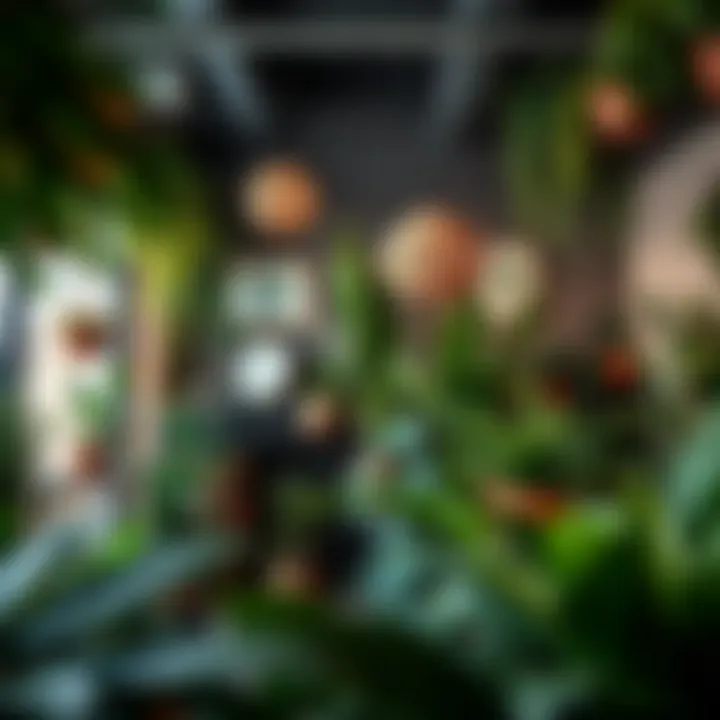
Intro
The desert sands of Dubai are often equated with starkness, but gradually, a transformation is unfolding, turning the landscape into a vibrant tapestry of greenery. The rise of plant studios in this bustling city offers a beacon for urban dwellers in search of harmony amidst the hustle and bustle. While many might picture towering skyscrapers and high-end boutiques, the concept of plant studios presents a unique blend of ecology and aesthetics, providing not just visual relief but tangible health benefits as well.
In recent years, the idea of cultivating plants has gained noteworthy traction. With a plethora of options ranging from succulents to flowering plants, individuals and families alike are starting to appreciate how these green enclaves can elevate their living spaces. This is much more than a trend; it’s a thriving movement redefining the urban experience.
Now, let’s delve deeper into the market tendencies shaping the plant studio landscape, pivotal investment areas, and the overall significance of integrating nature into our lives.
Understanding Plant Studios
Plant studios represent more than just a collection of greenery; they symbolize a growing movement towards integrating nature with urban life in Dubai. As the city evolves into a vibrant metropolitan hub, the role of plant studios becomes increasingly pertinent, ensuring that residents have access to natural elements amid a concrete environment. Their importance extends to environmental benefits, mental wellness, and enhancing the overall aesthetic of spaces within the city.
Definition and Concept
At its core, a plant studio is a dedicated space that fosters the growth and care of various plants, often designed to promote relaxation, creativity, and well-being. Think of it as a sanctuary where flora thrives alongside modern design. Unlike traditional gardens, which may be vast and often outdoors, plant studios in Dubai address urban constraints by creatively utilizing smaller, indoor areas. They serve multiple purposes—whether functioning as a hobby space, a commercial venture, or a tranquil oasis for individuals seeking reconnection with nature.
This prioritization of indoor gardening leads to several benefits. For instance, plants have been scientifically proven to enhance air quality. They absorb pollutants and release oxygen, thereby creating a healthier atmosphere in urban settings. Moreover, engaging with plants has been known to decrease stress levels, making plant studios not just a trend but a necessary addition to urban culture.
Historical Context of Plant Studios
The concept of cultivating plants in personal spaces isn’t new. Historically, the Arabian Peninsula has long maintained a fascination with botany. Traditional gardens often featured hardy native plants, such as date palms and desert roses, which adapted well to the arid climate. In Dubai, this historical inclination towards bringing nature into everyday life can be traced back to ancient times when community gardens thrived alongside bustling souks.
However, the modern notion of plant studios began taking shape as cities became denser and lifestyles transformed. As urbanization progressed in Dubai, spaces for nature dwindled. The introduction of concepts like vertical gardens and hydroponics can be seen as a response to these challenges. Presently, plant studios reflect not only a merging of tradition with innovation but also a proactive response to global environmental changes.
This evolution speaks volumes about Dubai's forward-thinking nature; as the emirate looks towards a sustainable future, plant studios embody both a return to tradition and a step forward into modern green living.
"In every plant studio, there's a story—a narrative that intertwines history, culture, and a shared pursuit of well-being."
Consequently, understanding plant studios involves recognizing their dual role as both preservers of cultural heritage and pioneers of sustainable practices. With each plant nurtured within these spaces, a deeper connection emerges between individuals and the environment they inhabit.
Significance of Plant Studios in Urban Dubai
The rising prominence of plant studios in Dubai speaks volumes about the city's evolving urban landscape. These spaces are not just havens for plants; they serve as vital components in enhancing the overall quality of urban living. Here, we will navigate the myriad significances of plant studios, shining a light on their role in beautifying the environment, enhancing mental well-being, and promoting biodiversity within the city limits.
Enhancing Urban Aesthetics
Plant studios undeniably contribute to the visual appeal of urban settings. In a city famed for its towering skyscrapers and bustling streets, the introduction of greenery provides a refreshing contrast. Picture this: vibrant splashes of green from various plant species intermingle with the chic architecture of Dubai’s landscape, forging a connection between nature and modernity.
Moreover, these studios create pockets of tranquility amidst the city's frenzy. Adding features like vertical gardens and green walls not only beautifies space but also attracts residents and visitors alike. The transformation of once barren walls into lush plant displays fosters a deeper appreciation for ecological beauty.
"Greenery doesn't just enhance aesthetics; it breathes life into the concrete jungle."
By reinvigorating public spaces and enhancing residential properties, plant studios can significantly uplift property values. This means not only does it brighten up a neighborhoood, but also the financial well-being of homeowners and investors benefits.
Promoting Mental Wellbeing
In today’s fast-paced world, stress is inescapable. However, the presence of plants has shown to have profound effects on mental health. Studies indicate that interaction with plants can reduce stress levels and boost overall well-being. Plant studios, with their organic layouts and calming presence, act as sanctuaries fostering mental health.
For instance, the simple act of caring for a plant — watering, trimming, or just observing its growth — encourages mindfulness. This form of engagement allows residents to momentarily step away from everyday stresses.
Plants also purify the air, which contributes to a healthier indoor environment. Cleaner air leads to clearer thoughts, and clear thoughts lead to better decision-making. Hence, plant studios are not merely about aesthetics but are critical in nurturing a healthier, happier community.
Contributing to Biodiversity
Setting up plant studios plays a key role in boosting urban biodiversity. In a city like Dubai, where nature can often feel sparse, these studios can introduce a variety of plant species, contributing to local ecosystems.
- Enhancing Habitat: By planting native species, studios provide habitats for local wildlife. Birds, insects, and even small mammals find essential resources in these urban oases.
- Supporting Pollinators: Many plant studios incorporate flowering plants, essential for attracting pollinators like bees and butterflies. This not only supports their populations but enhances pollination of surrounding plants, fostering stronger ecosystems.
- Education Initiatives: Many studios undertake educational programs about the importance of biodiversity, thereby encouraging community participation in ecological conservation.
In summary, as urban centers continue to expand, it’s crucial that we integrate green practices. Plant studios embody a step toward a more sustainable future, where lush, biodiverse environments flourish alongside urban development. In Dubai, these studios act not only as a means to beautify spaces but also lead to profound social and environmental impacts that are interconnected and vital for the overall health of the city.
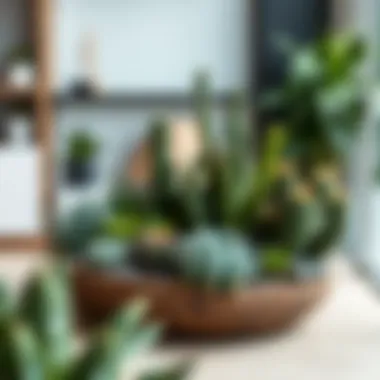
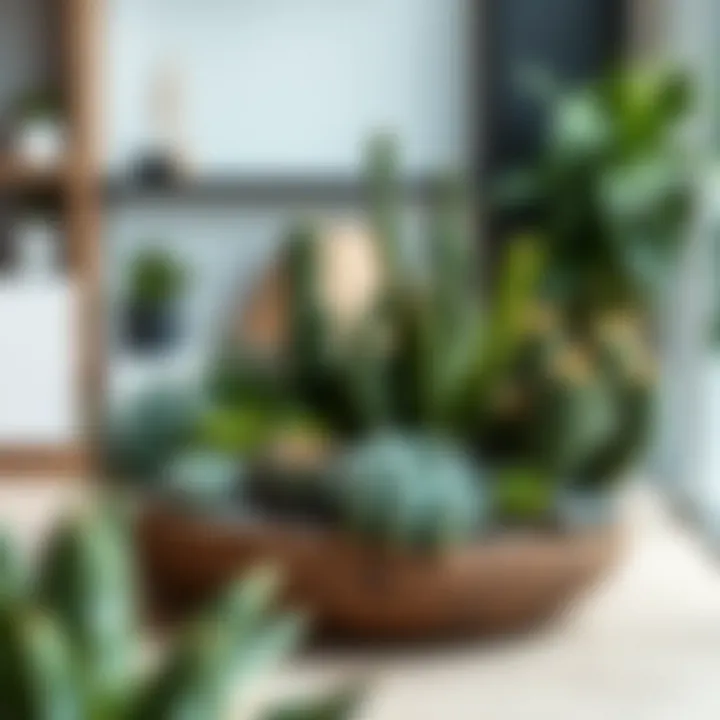
Design Elements of a Successful Plant Studio
Creating a highly functional and aesthetically pleasing plant studio in Dubai requires keen attention to several design elements. These elements go beyond the mere arrangement of plants; they encapsulate the essence of balance, comfort, and visibility that a plant studio should convey. With Dubai's unique climate and urban landscape, design becomes paramount in transforming a space into a thriving green haven.
Spatial Arrangement
Spatial arrangement is the backbone of any plant studio. It’s essential to consider how the plants are placed in relation to one another and the overall space. This not only affects the visual appeal but also the plants' health and growth. For instance, using vertical space can maximize area while creating a path for moving around or tending to the plants. Grouping plants with similar care requirements can also streamline maintenance tasks.
In Dubai, where space might be at a premium, utilizing vertical planters or shelving can give the studio a lush look without consuming too much floor area. Arranging taller plants at the back and shorter ones in the front creates depth and visual hierarchy. Furthermore, allowing ample space between plants enables good air circulation, reducing the risk of disease.
"The layout should invite the beholder to pause and appreciate the unique interactions between each plant, creating a play of shapes and textures."
Material Selection
The materials used in constructing and outfitting a plant studio significantly influence its functionality and sustainability. For plant studios in Dubai, it’s vital to select materials that can withstand heat while providing insulation and moisture retention. Natural materials, such as wood, are often preferred as they breathe and compliment the greenery within the studio. However, metals or concrete surfaces can be used if they undergo proper treatment to prevent heat absorption.
Additionally, pots and containers should be chosen carefully. Terracotta pots are not only porous but also allow evaporation, which can help in maintaining appropriate moisture levels. Meanwhile, lighter materials like fiberglass can be useful for larger installations, ensuring flexibility in arrangement. Incorporating eco-friendly materials can further reflect sustainability practices, appealing to conscientious investors and customers alike.
Lighting Design
Lighting can make or break a plant studio. In the heart of Dubai, where sunlight might be intense and unrelenting, having the right lighting scheme is essential. Natural light should be harnessed as much as possible, while also providing artificial options for cloudy days or evening enjoyment.
Strategically placing plants by the windowsills maximizes exposure to natural light, while adjustable fixtures can be installed in darker areas. LED grow lights can also be a great solution for specific plant types requiring more illumination without the high energy consumption associated with traditional bulbs. Ambient light should be considered as well, to create a warm and inviting atmosphere especially if the studio caters to visitors or buyers.
Balancing the light exposure will help in cultivating a diverse range of plants, contributing to the studio’s overall success.
Choosing the Right Plants for Dubai's Climate
Choosing the right plants is crucial for the success of plant studios in Dubai. The local climate poses unique challenges that can affect plant health and growth. Understanding how these plants adapt to heat, humidity, and aridity is fundamental for both novice and experienced plant enthusiasts.
Understanding Local Climate
Dubai's climate is classified as desert, characterized by extreme heat in the summer and mild winters. Temperatures often soar above 40°C (104°F) from June to September, with the humidity levels peaking during certain periods. These factors influence which plants can thrive in an indoor setting, especially those grown within plant studios.
The dry, arid conditions can make it difficult for many species to flourish, which means opting for plants that are drought-resistant is essential. Additionally, recognizing the seasonal variations helps in planning the kind of plants one can keep.
In practical terms, this means choosing plants that can handle high temperatures and low rainfall. Indoor environments must also consider how climate control affects air circulation, light levels, and humidity within the studio. All of these elements contribute to a plant's ability to not just survive, but thrive.
Best Plant Species for Indoor Studios
When it comes to choosing plants suitable for indoor studios in Dubai, a combination of resilience and aesthetic appeal should guide selections. Some species that have proven to be successful include:
- Snake Plant (Sansevieria): Known for its ability to tolerate neglect, it thrives in low light while improving indoor air quality.
- ZZ Plant (Zamioculcas zamiifolia): Extremely hardy, the ZZ Plant can go long periods without water and stands up well against ambient heat.
- Pothos (Epipremnum aureum): With its trailing vines, it adapts easily and grows well under various lighting conditions.
- Peace Lily (Spathiphyllum): Renowned for its beautiful white blooms, it also helps in purifying the air, making it an attractive option for studios.
These species not only adapt admirably to the local environment but also contribute to the aesthetic charm of any indoor studio.
Native Plants and Their Benefits
Incorporating native plants into plant studios not only aligns with sustainability practices but also offers numerous benefits. Native species are inherently adapted to local conditions, which decreases the chances of plant failure and reduces the need for extensive care. Some significant native plants that can be included are:
- Date Palm (Phoenix dactylifera): Iconic in the Emirates, these palms provide both shade and produce fruit.
- Ghaf Tree (Prosopis cineraria): This resilient tree is a national symbol and is known for its drought tolerance.
- Desert Rose (Adenium obesum): Featuring striking flowers, it thrives in arid conditions while being low maintenance.
Using native plants helps maintain local biodiversity and contributes positively to the ecosystem, creating a harmonious balance between urban living and natural landscapes.
Integrating local flora into plant studios not only enhances the plants' chances for optimal growth but also promotes a sense of cultural identity and connection to the environment.
Choosing plants that are well-suited to Dubai's climate will significantly impact the enjoyment and sustainability of plant studios, fostering a green oasis amidst the urban landscape.
Maintenance Practices for Sustainable Plant Studios
Maintaining a vibrant and healthy plant studio is horticulture's equivalent of keeping a well-oiled machine. When the upkeep is taken seriously, the benefits can lead to lush greenery and an inviting atmosphere. Neglect it, and you may just end up with droopy leaves and unhappy plants, causing a ripple effect on overall well-being. In urban environments like Dubai, where climate challenges abound, implementing effective maintenance practices is not just desirable, it’s essential.
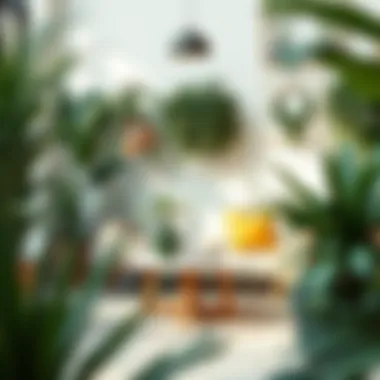
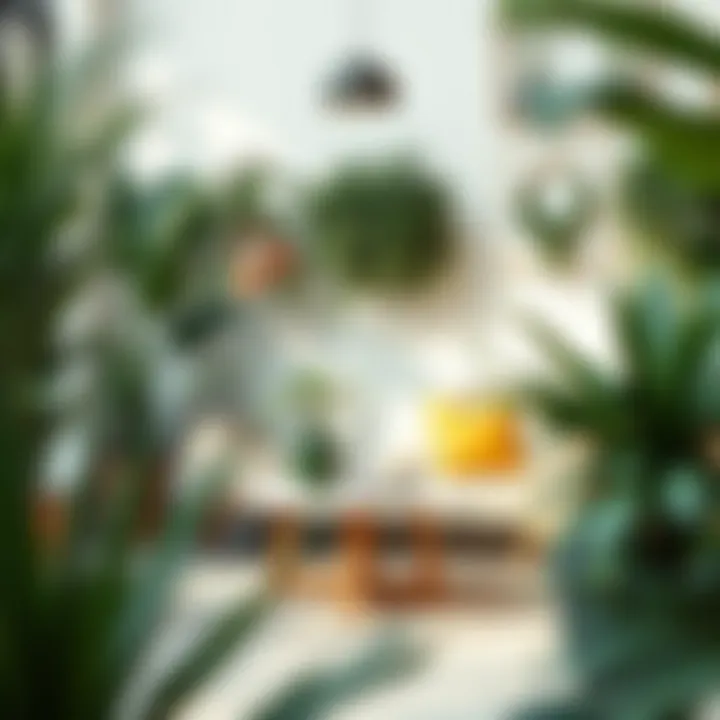
Watering Techniques
Water is the lifeblood of any plant, but navigating the watering landscape in a city like Dubai can be tricky. It’s vital to understand that each plant species has its own set of needs, so a one-size-fits-all approach rarely cuts it. Here are some insights:
- Time of Day: Watering in the cool of early morning or late afternoon can ensure better absorption before the scorching heat sets in.
- Soil Moisture Check: Stick your finger an inch or two into the soil. If it feels dry, it’s time for a drink. If it’s still moist, you may want to hold off.
- Drip Irrigation Systems: These systems can be a real game changer when it comes to conserving water while delivering it directly to where it’s needed.
- Grouping Plants: Placing plants with similar watering needs together can make it easier to manage their hydration.
Fertilization Routines
The soil in which the plants grow must be nourished just as much as the plants themselves. Fertilization is where it all starts. Here’s how to get it right:
- Organic vs. Synthetic: While synthetic fertilizers can offer a quick boost, organic options, such as compost, can enrich the soil's microbiome and create long-term health for your plants.
- Seasonal Schedule: Different types of plants have varied fertilization cycles. It’s smart to fertilize in the growing season and refrain during dormant periods.
- Water-Soluble Solutions: A diluted liquid fertilizer can provide nutrients quickly during watering sessions but must be applied sparingly to avoid nutrient burn.
- Soil Testing: Conducting tests can reveal the pH and nutrient levels in the soil, allowing for tailored modification of your fertilization approach.
Pest Management Strategies
Plants can be vulnerable to pests that, if left unchecked, can hinder their growth. Tackling these issues proactively can save you time and trouble down the line.
"An ounce of prevention is worth a pound of cure."
- Regular Checks: Inspect plants regularly for any sign of infestation, no matter how minor it may seem. Early intervention is crucial.
- Natural Predators: Introducing beneficial insects such as ladybugs or predatory mites can help keep pest populations at bay without resorting to harsh chemicals.
- Neem Oil: This natural remedy can deter various pests while also promoting a healthy plant environment.
- Integrated Pest Management (IPM): This holistic approach combines cultural, biological, and chemical tactics, aimed at reducing dependency on synthetic pesticides.
By paying attention to these maintenance practices, plant studios in Dubai can thrive, turning a humble space into green sanctuaries that enhance the urban landscape. It isn't just about plant health, but mutually reinforcing the positive impact on mental and emotional well-being. After all, sustainable practices today pave the way for greener tomorrows.
Cultural Influences on Plant Choices
When one thinks about the thriving metropolis of Dubai, the mind often conjures images of soaring skyscrapers and bustling marketplaces. Yet, nestled within this urban jungle are plant studios, rich with culture and meaning. The choices made in selecting plants for these studios are often deeply influenced by cultural significance, personal values, and historical contexts that shape like the sands of time. Recognizing how cultural influences impact plant choices is essential for enthusiasts, investors, and anyone who desires to dive deeper into the narrative of Dubai's botanical landscape.
Traditional vs. Modern Plant Choices
In the context of Dubai, traditional plant choices are not merely a nod to the past; they are steeped in a wealth of cultural heritage. Plants like the date palm, Phoenix dactylifera, have been pivotal in Emirati culture, symbolizing sustenance and hospitality. Traditionally, these palms were planted around homes, providing shade and food, while also serving as a representation of community and familial bonds.
On the flip side, the modern inclinations towards plants have taken on a more global view, reflecting a fast-paced lifestyle infused with exposure to diverse cultures. This has led to a melting pot of choices in plant selection, where cacti, succulents, and other exotic species are favored for their low maintenance and aesthetic appeal.
The juxtaposition between traditional and modern plant choices can be understood as:
- Traditional Choices:
- Modern Choices:
- Date Palm: Offers shade, sustenance, and family ties.
- Ghaf Tree: Symbolizes resilience and is the national tree of the UAE.
- Succulents: Low maintenance, trendy indoor plants known for their unique shapes.
- Fiddle Leaf Fig: Popular in modern decoration, linking nature with contemporary design.
Symbolism of Plants in Emirati Culture
Each plant selected for a studio tells a story, often reflecting the cultural significance it holds within Emirati society. For instance, the Ghaf tree is revered not just for its hardiness in arid climates but also as a historical symbol of life. It thrives in the sands and symbolizes sustainability, which resonates deeply with Emirati identity.
Furthermore, the rose in Emirati culture embodies beauty and friendship. It is common to find rose bushes in gardens and homes as a gesture of good will and hospitality. This resonation with culture goes beyond aesthetics; it weaves a narrative of connection to heritage, portraying values that have been passed down through generations.
The symbolism of plants touches various aspects of daily life:
- Hospitality: Plants like jasmine may welcome guests, their gentle fragrance creating an inviting atmosphere.
- Identity: The date palm serves as a testament to Emirati resilience and connection to the land.
- Art and Aesthetics: Flowers, such as orchids, are often used in festivals and celebrations, merging nature with communal joy.
In the end, understanding the cultural influences on plant choices in Dubai offers invaluable insights into the region’s identity and values. For investors and plant enthusiasts, recognizing these dynamics can guide sustainable practices and deepen engagement with local communities, enriching the experience of cultivating plant studios.
Exploring Notable Plant Studios in Dubai
In the bustling environment of Dubai, plant studios have become a sanctuary for nature enthusiasts, interior designers, and anyone looking to bring a slice of the outdoors inside. These studios do not just serve a practical purpose but also contribute significantly to the aesthetic value of urban spaces. They play a pivotal role in bridging the gap between the city’s fast-paced lifestyle and the natural world, offering an oasis of calm amidst the concrete jungle. This section aims to introduce some of the most remarkable plant studios that Dubai has to offer, laying a foundation for understanding their functions and benefits.
Top Plant Studios around the City
Dubai showcases a variety of plant studios, each offering unique features and attractions. Some of the standout names in the city include:


- The Dubai Plant Studio: Nestled in the heart of the city, this studio specializes in an array of indoor plants perfect for homes as well as offices. It prides itself in expert advice on plant care, ensuring every green companion thrives.
- Gardens by the Bay: Known for its stunning design and variety, it presents a tranquil setting filled with extraordinary plants sourced from around the globe. Visitors can immerse themselves in seasonal exhibitions that highlight different plant species.
- Botanic Joy: A funky spot that focuses mainly on succulents and cacti, this studio captures the quirky side of plant ownership. Its workshops are popular among millennials eager to integrate plants into their décor.
- Urban Jungle: This studio emphasizes sustainable practices, featuring a mix of native and exotic plants. They often hold events that foster community participation in gardening projects, aligning with Dubai’s goals for eco-friendliness.
These studios stand out not just for their products but also for their contributions to environmental awareness and community engagement.
Unique Offerings in Each Studio
Each plant studio presents its own flair, enriching the overall experience for visitors:
- The Dubai Plant Studio offers personalized interior consultations, where experts analyze a space and suggest suitable plant placements, ensuring both aesthetics and health benefits.
- Gardens by the Bay is not just a retail space; it conducts workshops and tutorials on exotic plant care, allowing enthusiasts to deepen their knowledge while having fun.
- Botanic Joy hosts DIY events where participants can create their own terrariums. This hands-on approach makes plant ownership accessible and fun for everyone, regardless of skill level.
- Urban Jungle has an innovative loyalty program that rewards customers for sustainable practices, such as recycling pots and attending workshops. This not only encourages repeat visits but also instills a sense of responsibility towards the environment.
"Plant studios in Dubai are not mere shops; they are community hubs, fostering connections between people and nature."
These unique offerings highlight the studios' commitment to education, sustainability, and community renewal, making them invaluable assets to the city.
As each studio evolves, they not only cater to a growing demand for houseplants but also contribute to a larger dialogue about green living in an urban context.
Establishing Your Own Plant Studio
Creating a plant studio in Dubai presents an exciting opportunity to contribute to the urban landscape. As interest in greenery in urban settings grows, establishing a plant studio can serve not only as a place for enthusiasts to gather but also as a means to promote environmental awareness. The act of creating such a space involves thoughtful planning, a clear understanding of market demand, and a deep appreciation for the flora that thrives in Dubai's unique climate.
When embarking on this journey, it's essential to recognize the underlying purpose of a plant studio. It’s not merely a business endeavor; it's about fostering a connection between people and nature, perhaps even facilitating calmer living spaces amid the hustle and bustle of city life.
Key Steps to Launching a Plant Studio
Starting a plant studio requires careful planning and execution. Here are some foundational steps to get you off on the right foot:
- Conduct Market Research: Understand the local demand for plants and plant-related services. This involves checking out competitors' offerings and identifying gaps you could fill.
- Define Your Niche: Will your studio focus on houseplants, succulents, or maybe herbs? Having a clear focus will guide your inventory choices and marketing efforts.
- Develop a Business Plan: Outline your mission, goals, financial projections, and logistic considerations like sourcing plants and managing inventory.
- Secure Funding: Evaluate how you will cover initial costs. This could involve personal savings, loans, or investors.
- Legal Structure and Registration: Determine the structure of your business—whether it be a sole proprietorship, partnership, or a different model—and proceed to register your business according to Dubai's regulations.
- Create a Brand Identity: A memorable name and logo can help your studio stand out. Marketing through social media platforms like Instagram can be particularly effective, as visual content resonates well in this niche.
- Establish Supply Chains: Find reliable suppliers who can provide a steady flow of quality plants. Consider local sources where possible to foster community ties.
By following these steps, you can create a solid foundation for your plant studio that not only serves customers but also enriches the local community.
Finding the Right Location
Location can dictate the success of a plant studio. Here are a few considerations to keep in mind while scouting for the perfect spot:
- Accessibility: Choose a site with good foot traffic or easy access to public transportation. This can drive spontaneous visits.
- Space Requirements: The studio needs ample space for plants, display arrangements, and perhaps a workshop area for events and classes.
- Target Demographics: Analyze the surrounding population. Today, many millennials and Gen Z-ers are investing in plant care; thus, consider areas where these demographics reside or frequent.
- Visibility: A location that catches the eye can draw in curious passersby. A well-designed storefront will attract attention and encourage inquiries.
- Competition Proximity: Too many similar businesses nearby can saturate the market. Conversely, being near complementary businesses, such as cafes or artisan markets, could be beneficial.
A strategic location can mean the difference between thriving and merely surviving in the competitive plant industry.
Impact of Technology on Plant Studios
In today's fast-paced world, technology is redefining how we cultivate and interact with nature, particularly in urban settings like Dubai. The use of technology in plant studios is not just a trend; it’s becoming a fundamental aspect of sustaining greenery in a desert metropolis. From automatic irrigation systems to technological platforms that promote plant care, advancements are elevating the ways we engage with plants. This section explores these vital elements, shedding light on their benefits and considerations for anyone invested in the realm of plant care and studios.
Advancements in Plant Care Technology
The evolution of plant care technology has made it significantly easier to maintain lush green spaces indoors, particularly in regions with harsh climates. A myriad of smart devices is now available that can help plant enthusiasts keep their greenery thriving with minimal effort. Here are some noteworthy advancements:
- Automated Irrigation Systems: These systems ensure that plants receive the right amount of water at the right time. By utilizing sensors that monitor soil moisture levels, they prevent over- or under-watering—an essential aspect for the resilient yet challenging plants suited for Dubai.
- LED Grow Lights: The unique climate of Dubai sometimes limits the natural light available for plants. Advanced LED grow lights replicate the sun’s spectrum, giving plants the energy they need to grow. They're energy-efficient and can often be controlled remotely, enhancing convenience and effectiveness.
- Plant Health Sensors: Some devices not only track moisture but also analyze nutrient levels, temperature, and humidity, sending alerts when any fluctuations occur. This proactive approach allows enthusiasts to intervene timely, ensuring that their plants remain healthy and vibrant.
These advancements have transformed plant studios into more efficient ecosystems, making it feasible for people to enjoy greenery even in challenging environments.
The Role of Social Media in Popularity
Social media has proved to be a driving force behind the growing popularity of plant studios in Dubai. Platforms like Instagram and Facebook serve as vibrant stages where plant aficionados showcase their collections, fostering a community of plant lovers eager to share tips and ideas.
- Visual Appeal: The aesthetic nature of plants makes for striking visual content. Users often post images of their thriving plant studios, inspiring others to create similar spaces.
- Knowledge Sharing: Social media groups and forums serve as platforms for sharing best practices. Here, novice gardeners can glean insights from seasoned pros, which carries immense value in a city like Dubai, where plant care can be intricate.
- Local Events and Workshops: Many plant studios utilize social media to promote events, such as workshops on plant care or skills like terrarium building. This encourages local engagement and connection, rooting the idea of plant ownership in the community.
"In a city ruled by glass and steel, plant studios offer a touch of green, melding nature with technology."
Finale
The exploration of plant studios in Dubai serves as more than just a trend; it illustrates a movement toward integrating nature within urban living spaces. In this bustling metropolis, where skyscrapers often dominate landscapes, plant studios emerge as sanctuaries that promote both aesthetic beauty and mental well-being. As we've discussed, these spaces do not simply house plants; they foster a relationship between residents and nature, thereby reducing stress and enhancing quality of life.
Future of Plant Studios in Dubai
The future looks bright and green for plant studios as awareness grows about the mental health aspects linked to nature. Modern urban dwellers increasingly seek environments that offer respite from the fast-paced lifestyle characteristic of city living. Here are some focal points to consider:
- Awareness and Education: As more people become conscious of the benefits of greenery, there will be a surge in workshops and courses aimed at educating the public about plant care and the importance of biophilic design.
- Sustainable Practice: The push toward sustainability is set to reshape how plant studios operate and manage resources. Expect practices like zero-waste initiatives and the use of rainwater harvesting to become commonplace.
- Technological Innovation: The marriage of technology and plant care will likely evolve. Concepts such as smart irrigation systems that adjust to moisture levels and apps for plant diagnosis could redefine maintenance practices.
- Community Spaces: Plant studios may shift focus to becoming community hubs, where individuals can grow their gardening skills, partake in workshops, and share plant care tips, fostering stronger community ties.








